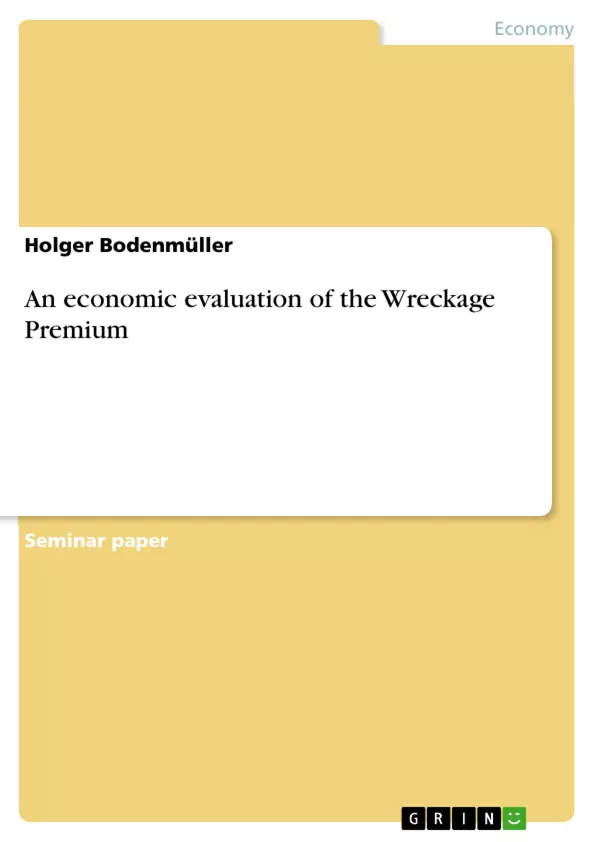The wreckage premium still is a topic of controversial debate. Almost two years after the completion a lot of data is available. Taking all effects into consideration the resulting image is multifaceted. All indicators show that the economical and ecological effects have been rather low. Positive effects have been temporary and only parts of the automotive industry took profit from the governmental support program in the scope of the Konjunkturpaket II. Other sectors, the used car market and independent workshops had to suffer from the negative effects of the wreckage premium. Although scrapping schemes were introduced all over Europe it remains questionable if the wreckage premium was a help to reduce the negative impact of the crisis. Maybe on a short-term perspective there was a positive effect. At the latest at the next tax increase it is worth considering if selective support programmes with a doubtful sustainability should increase national debts in the amount of 5 Billion Euros.
Inhaltsverzeichnis (Table of Contents)
- Introduction/Problem Definition
- Objectives
- Methodology
- Main Part
- Wreckage premium: economic-political background
- Wreckage premium: Facts and figures
- Wreckage premium: An economical evaluation
- Wreckage premium: An ecological evaluation
- Wreckage premium: Other collateral effects
- Conclusion
- ITM Checklist
- Bibliography
Zielsetzung und Themenschwerpunkte (Objectives and Key Themes)
This report aims to evaluate the effectiveness of the wreckage premium as a tool to mitigate the negative impact of the economic crisis on the automotive industry. It analyzes the economic-political background, provides an overview of relevant data, and examines the program's economic and ecological effects.
- Economic-political context of the wreckage premium
- Analysis of data related to the wreckage premium
- Economic impact of the wreckage premium
- Ecological impact of the wreckage premium
- Collateral effects of the wreckage premium
Zusammenfassung der Kapitel (Chapter Summaries)
- Introduction/Problem Definition: This chapter introduces the topic of the wreckage premium and outlines the research question: was the wreckage premium effective in mitigating the negative impact of the economic crisis?
- Objectives: The objectives of this study are presented, focusing on analyzing the economic and ecological effects of the wreckage premium, along with its broader impact on the automotive industry.
- Methodology: This chapter details the research methods used to gather and analyze data related to the wreckage premium. It discusses the sources of information and the specific techniques employed in the study.
- Main Part:
- Wreckage premium: economic-political background: This section examines the economic and political context surrounding the introduction of the wreckage premium. It explores the rationale behind the program and the motivations of policymakers.
- Wreckage premium: Facts and figures: This section provides a comprehensive overview of data related to the wreckage premium. It analyzes key statistics, including the number of vehicles scrapped, the cost of the program, and the impact on car sales.
- Wreckage premium: An economical evaluation: This section evaluates the economic impact of the wreckage premium. It examines the program's effect on the automotive industry, consumer behavior, and overall economic growth.
- Wreckage premium: An ecological evaluation: This section assesses the ecological effects of the wreckage premium. It analyzes the program's impact on emissions, resource consumption, and environmental sustainability.
- Wreckage premium: Other collateral effects: This section explores the broader impact of the wreckage premium on other sectors of the economy and society. It examines the effects on the used car market, independent workshops, and other related industries.
Schlüsselwörter (Keywords)
The key keywords and focus topics of this study include: wreckage premium, economic crisis, automotive industry, economic impact, ecological impact, government intervention, consumer behavior, environmental sustainability, data analysis, and policy evaluation. The study focuses on assessing the effectiveness of the wreckage premium as a tool for economic stimulus and environmental improvement.
Frequently Asked Questions
What was the primary goal of the wreckage premium (scrapping scheme)?
The primary goal was to mitigate the negative impact of the economic crisis on the automotive industry as part of the Konjunkturpaket II.
Was the wreckage premium economically effective in the long term?
According to the study, the economic effects were rather low and mostly temporary, primarily benefiting only specific parts of the automotive industry.
What were the ecological impacts of the program?
The ecological indicators showed that the positive environmental effects were low and the overall sustainability of the program remains questionable.
Which sectors suffered negative effects from the wreckage premium?
The used car market and independent workshops were among the sectors that suffered from the collateral negative effects of the scheme.
What was the total national debt increase caused by this program in Germany?
The program increased national debt by approximately 5 billion Euros.
Did the program significantly improve environmental sustainability?
No, all indicators analyzed in the report suggest that the ecological effects were minimal and did not provide long-term sustainability.
- Quote paper
- Holger Bodenmüller (Author), 2011, An economic evaluation of the Wreckage Premium, Munich, GRIN Verlag, https://www.grin.com/document/271649



